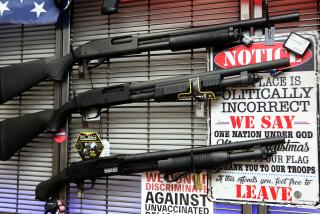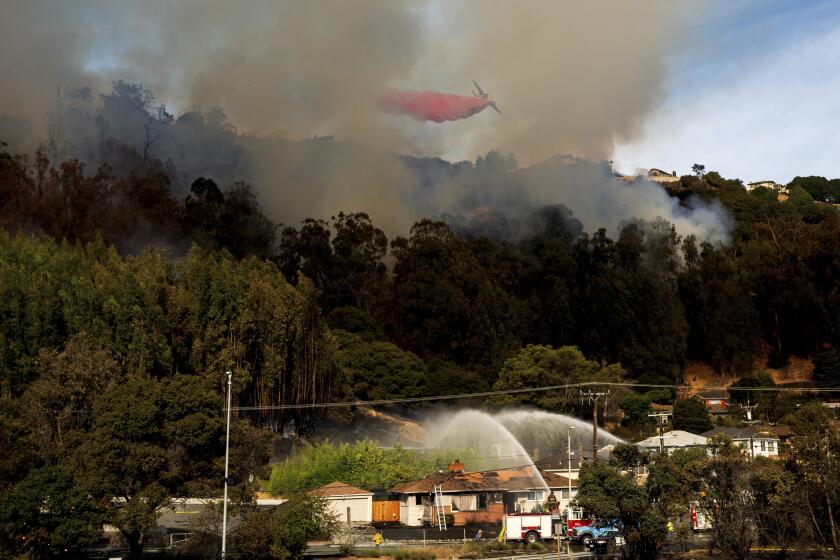Pasadena Bullet Law May Inspire Similar Efforts : Violence: Los Angeles and Azusa officials say they would favor restricting ammunition sales. But opposition is likely to be strong.
Pasadena’s precedent-setting--and controversial--passage of a law to restrict handgun ammunition sales may be only the first such local measure.
Emboldened by their counterparts’ late-night, 5-2 vote on Monday, officials in Los Angeles and Azusa on Tuesday expressed support for such laws in their cities.
As the movement to regulate bullet sales appeared to gain momentum, Los Angeles City Councilwoman Rita Walters even suggested taking it a step further by requiring people to go through a background check and get a permit before being able to buy ammunition.
When it takes effect, Pasadena’s new ordinance will require anyone buying handgun ammunition in that city to provide identification showing proof of age and to complete a registration form listing the amount, brand and type of ammunition bought. Current law prohibits juveniles from purchasing ammunition.
Proponents say the law is designed to curb handgun violence, especially among teen-agers. But critics--some of whom promised Tuesday to file a lawsuit challenging the ordinance--have said the measure is an unconstitutional and hollow symbol that will have little effect on crime statistics.
Reacting to threats of legal action, Pasadena city officials Tuesday called a news conference to stand by their actions. “We’re not going to be any more intimidated by the gun lobbyists’ lawyers than (by) gang members in the park,” Councilman Rick Cole said.
The officials and Pasadena citizens groups also began looking for other cities to take a seat on their bandwagon. And they did not have to wait long.
Azusa Police Chief Byron C. Nelson vowed to try to pass the same ordinance in his city within 30 days. Nelson, the president of the San Gabriel Valley Police Chiefs Assn., said he also plans to tout the idea to the other 22 agencies in the group.
Meanwhile, at least eight Los Angeles City Council members--a majority of the 15-member panel--and Mayor Richard Riordan indicated that they would support such a measure. At the urging of City Councilman Marvin Braude, who attended the Pasadena session at which the pioneering law was approved, a three-member committee unanimously asked the city attorney to draw up a proposal based on the smaller city’s measure.
“Maybe we’ve waited too long, but I think anything we can do to slow up the use of guns we should do,” Los Angeles City Council President John Ferraro said Tuesday.
Glendale Police Chief James E. Anthony, president of the 350-member California Police Chiefs Assn., said he, too, would support ammunition restrictions in certain cities, although he predicted they would be a “hard sell” in some places.
While Pasadena is apparently the first municipality in the nation to enact such a measure, gun control advocates cited a domino principle in predicting that it probably won’t be the last.
“In general, crime legislation spreads from one place to another and somebody has to be first,” said Jeffrey Butts, senior research associate for the Pittsburgh-based National Juvenile Justice Center. “Somebody comes up with an idea, passes it. A few more places try it. Then, once it passes constitutional muster, then it goes all over.”
If Los Angeles, the nation’s second-largest city, were to approve such a measure, many cities in and out of California would be inspired to take up the issue, said Jeff Muchnick, legislative director of the Coalition to Stop Gun Violence in Washington, D.C.
“Taking nothing away from Pasadena,” Muchnick said, “when small places take up what are seen as oddball ordinances, they don’t carry the weight of a Los Angeles.”
But the reaction of a handful of nearby cities indicates there isn’t a groundswell yet.
In Long Beach, Mayor Beverly O’Neill’s top aide, Randal Hernandez, said neither the mayor nor any City Council members have proposals restricting ammunition sales on their agendas.
“We’re trying to be more proactive--community policing and decentralizing our Police Department by creating substations in various parts of the city,” he said of Long Beach’s efforts to combat youth violence.
Among the Los Angeles City Council members, however, there was a clear eagerness to address the ammunition issue.
“It’s not the whole solution, it’s a stopgap measure. But any measures we can take to help keep ammunition out of the hands of youths should be supported,” Councilman Mike Hernandez said.
“I congratulate the Pasadena City Council, and I do hope we will be able to join them,” said Councilwoman Jackie Goldberg. “Certainly we understand that in reducing the number of bullets . . . you also reduce the amount of violence.”
Los Angeles Police Commissioner Gary Greenbaum stopped short of embracing the ammunition ordinance. He called it “provocative and interesting,” but said he needs more information on it before backing it.
If Pasadena’s experience is any indication, Los Angeles, Azusa and other cities that consider regulating ammunition sales will face a deep well of opposition.
A vocal crowd of about 200 jammed into Pasadena’s 70-seat City Council chamber Monday, the majority cheering when someone spoke against the ordinance and booing when someone supported it. Beyond issues of constitutionality and rights to privacy, opponents derided the law as a fraud that would divert attention from real solutions in the war being waged against youth violence.
Shirley Links, owner of an outdoors shop, criticized the proposal as a cosmetic approach to fighting crime. “You’re not attacking the real issue, which is enforcing the laws,” she said.
Roy Begley called the ordinance “nutty” and “touchy-feely,” adding: “This whole ordinance is directed against the victims and not against the criminals.”
Among those expressing support for Pasadena’s law, Otis Knox appeared to best sum up the views of even the law’s sponsors, many of whom acknowledge that the problem of juvenile violence defies simple solutions. “This ordinance is too little, too late,” Knox said. “But we need to do something .”
Times staff writers Edward J. Boyer, Rick Holguin and Hugo Martin contributed to this story.
More to Read
Sign up for Essential California
The most important California stories and recommendations in your inbox every morning.
You may occasionally receive promotional content from the Los Angeles Times.











